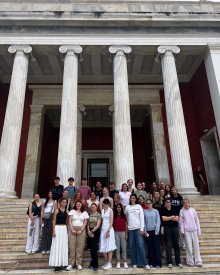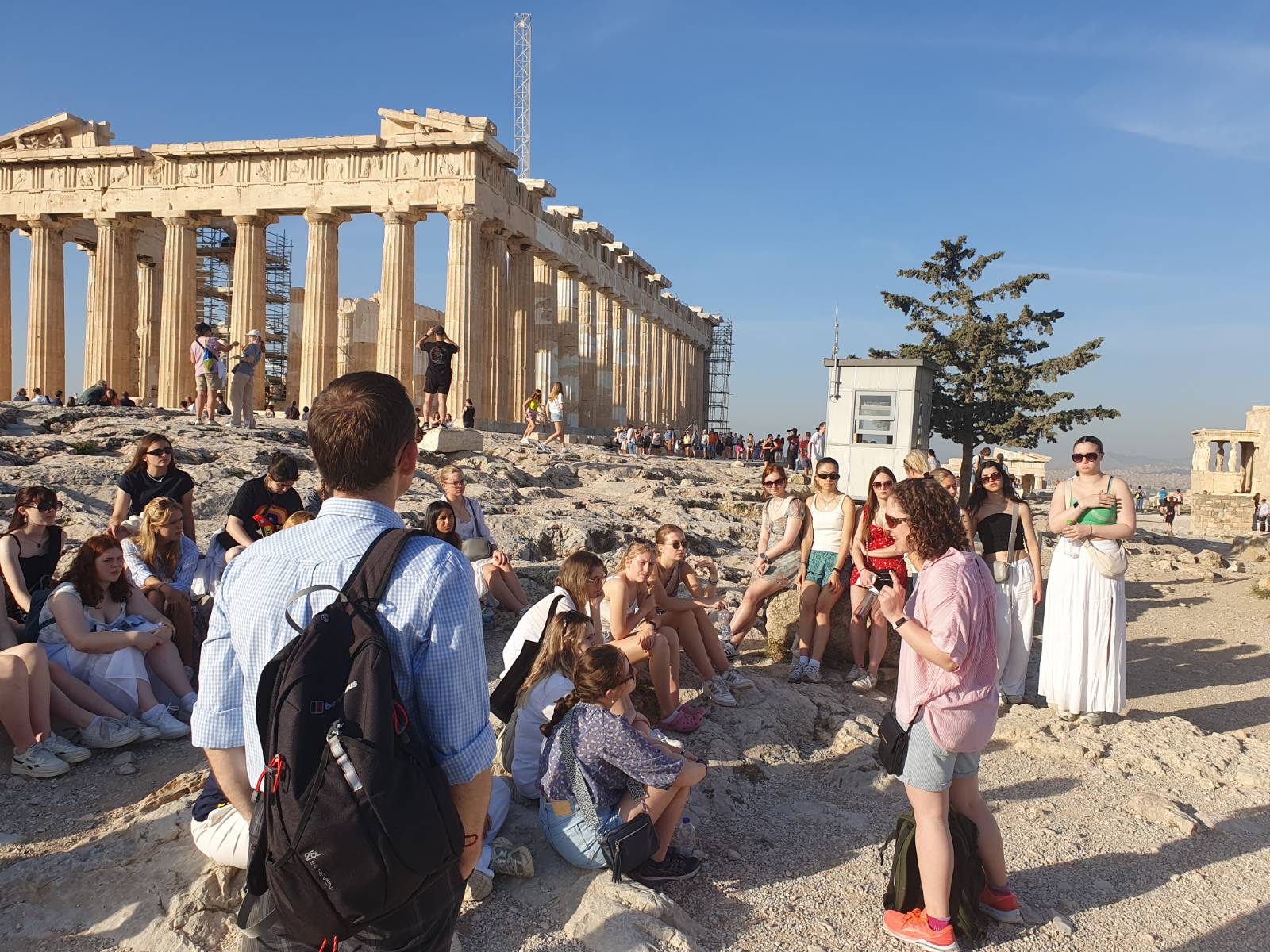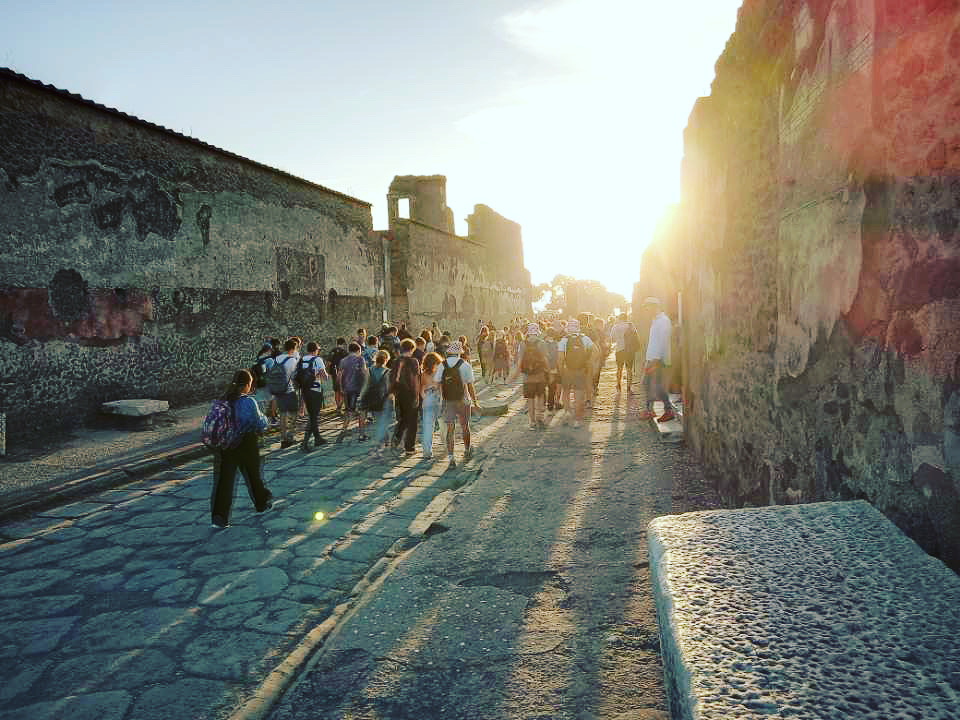
Spotlight On: Classics
At St Peter’s, our curriculum allows pupils to discover their passions and pursue their interests, leading them to further study at some of the world’s leading universities. We offer a range of subjects, with specialised teachers from Year 4.
The department focus of this article is Classics, which allows pupils to delve into the study of ancient civilisation from as early as Year 6!
An early introduction into Greek mythology in Year 6 sparks an interest in pupils in learning more about the culture which has influenced so much of what we know today. Pupils will begin studying Latin as part of their curriculum in Year 7, which develops a knowledge and understanding of Classical Greece and Rome through an enjoyable study of language, literature, history, art and ideas, until Year 9, when both Classical Civilisation (Classics) and Latin are offered.

In Year 10, pupils are given the option to continue their study at GCSE Level. Both subjects are always a popular choice, proving a clear interest in developing their understanding of Greek and Roman civilisation. It is also a fantastic option for those who have not been through the school, since the course does not require any previous experience of Latin or the Classical world, and works well in conjunction with all option subjects, adding depth of perspective and experience or a welcome variety. Modules on Roman City Life and Women in the Ancient World allows a consideration of a wide range of issues, including the analysis of ethical, political, religious and social questions. The study of Latin develops language awareness, fosters a sensitive and analytical approach to language and highlights the considerable influence of Latin on modern European languages, and the addition of Greek presents a further, fresh challenge to the most aspirational and committed pupils. Many pupils appreciate the chance to get two GCSE’s from one option block when studying Gratin.
In the Sixth Form, pupils may choose to continue their study in Classical Civilisation, Latin and/or Classical Greek. In languages, pupils can expect a high degree of competence and understanding, and will extend these skills through the reading of original texts within exams and ultimately assess the impact of literature on political and social trends. The course helps build skills which are useful in other areas of study, such as History, History of Art, Politics, English Literature.
For more on the St Peter’s 13-18 curriculum, visit here, and for the St Peter’s 8-13 curriculum, visit here.
Outside of the classroom, the department also offers a multitude of trips and activities. In Year 8, the pupils attend a Classics Quiz, led by the Sixth Form pupils, which gives them a fun activity to learn and hear from older pupils who enjoy the subject. In Year 9, the whole year has a day out exploring York, including the Yorkshire Museum, York Minster, Baths and the York Walls. At GCSE, trips are further afield, with year groups visiting Rome and Pompeii in alternate October half-terms. At A Level, the Sixth Form travel to Greece at a similar time.
For more on trips at 13-18, visit here. For 8-13, visit here.
This year, we have two Classics classes in the Lower and Upper Sixth, showing a big uptake and enthusiasm for the subjects. There are multiple pupils applying to study classical degrees at university, including Florry, who had never heard of Classics prior to starting Sixth Form at St Peter’s and is now hoping to continue her study at Oxford University. Another pupil is Charlotte, who studies Latin and Greek, gave a talk about the Symposium as part of our Laurentius Lectures and has given talks to our Year 7s about studying Latin. Charlotte is applying to study German and Classical Languages at Oxford, too, and has written a piece about studying Classics at St Peter’s.
What A Levels are you currently studying?
Latin, Ancient Greek, and German for A Level.
I also taught myself AS Politics and I have just finished an EPQ concerning the influence of Ancient Egypt on Ancient Greece.
What do you hope to study at university and where?
I hope to continue studying Latin, Ancient Greek, and German in the Joint Honours course, ‘Classics and German’.
I would like to study at Oxford (ideally), and have also applied to Edinburgh, Durham, UCL, and Exeter.
What trips have you been on with St Peter’s Classics Department?
I went on the St Peter’s Classics trip to Greece this October. We visited Delphi, Olympia, Athens, Tiryns, and Mycenae. I found it not only incredibly interesting and educational, but every place we went to was beautiful and full of history. Plus, at every stop we were given talks from members in either the Classics or Religious Studies departments which was fascinating.
Over exeat, I am going on a non-school planned trip to Rome with the two other members of my Latin class. There we will visit the Colosseum, Vatican, Roman Forum, and Roman Temples, as well as other sights.
When did you first know you had an interest in Classics, Latin and Greek? Did you begin your study before or after this?
I have always had a huge interest in languages, specifically philology and etymology. Before I opted to do Greek for GCSE, I had no idea how much I would enjoy it compared to French, English or even German, but coupled alongside my previous Latin studies, the two made my critical analysis skills and writing ability undeniably better. I also enjoyed the challenge that came with writing in a new alphabet and the differences in grammar, skills which I worked on at the JACT Greek summer school at Bryanston, Dorset. Overall, I would say that I first gained an interest for the written languages themselves before classical mythology or literature, though I have always found ancient history and politics fascinating.
What is your favourite part about studying Latin and Greek at St Peter’s?
Definitely the teaching staff. St Peter’s is lucky to have a large number of enthusiastic department members who offer not only qualifications in Classical Civilisation and Latin, but a GCSE and A Level in Ancient Greek, as well as various ISSP courses. Each teacher has also been incredibly helpful with giving out and marking extra work in preparation for my university admissions tests, which I am incredibly grateful for. Also, the opportunity to help out in J4 Latin classes and teach them an introduction to Ancient Greek has, I hope, inspired more students to study these subjects at GCSE.
Ultimately, I would have to say the most fun part of my classical studies at St Peter’s has been ‘Manor Saturdays’, which the other members of my Latin class will definitely agree with. At the end of a long week in Lower 6th, we would all head over to the Manor boarding house for Saturday P1 Latin with Mr Noy Scott, where we would do Latin Prose composition, alongside a hot chocolate with whipped cream and marshmallows. It’s safe to say the whole department knows that biscuits and hot drinks are key to a good translation!
What do you hope to do in the future?
After doing a 4/5-year degree at university I’m not completely sure what I will be doing next. Following summer work experience in the House of Commons, I am now considering going into politics, potentially in policymaking or something regarding English-German relations. It also depends on how I enjoy my year abroad in university as to whether I would want to continue living in Germany, Austria, or Switzerland. That being said, visiting these countries while interrailing and regular stays with a native German couple are experiences that have been insightful and rewarding; I look forward to spending more time in these places. For now, I am concentrating on getting into a good university and continuing my studies of the subjects I love. Who knows where I’ll be in 10 years!
.JPG)




















.JPG&command_2=resize&height_2=85)
.JPG&command_2=resize&height_2=85)


